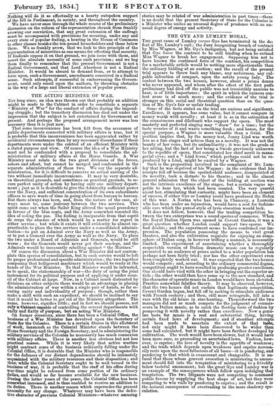THE GYE AND Ll7MLEY MORAL.
THE great cause of Lumley versus Gye has terminated in the de- feat of Mr. Lumley's suit ; the Jury recognizing breach of contract by Miss Wagner, at Mr. Gye's instigation, but not being satisfied that Gye knew the contract to be still binding when he enticed Miss Wagner to break her engagement. Supposing him not to have known the continued force of the contract, his competition for a marketable article would be nothing more objectionable than the ordinary bidding at an auction ; and the result of the present trial appears to throw back any blame, any unfairness, any cul- pable infraction of compact, upon the astute yoang lady. The contest between the two houses, however, about a prima donna who never appeared, and whom after the effect of the first puffs preliminary had died off the public was not irresistibly anxious to hear, is of little importance ; the spirit in which the ruinous con- test arose is of much more ; and the evidence of the trial is stronger on this social and theatrical question than on the ques- tion of Mr. Gye's fair or unfair trading. Some of the facts stated on the trial are curious and significant. Excellence, it appears, has some value, but it cannot compare in money worth with novelty ; at least it is so in the estimation of the connoisseurs and dilettanti who support the opera. The most masterly and perfected singing may " draw" for a time ; but the taste wearies of it and wants something fresh ; and hence, for the special purpose, a Wagner is more valuable than a Grisi. The position implies that, by the money test, Jenny Lind was worth less as a fine singer and actress than as a novelty. It was not the beauty of her voice, but its unfamiliarity ; it was not the grade of her acting, but the fact of her being a Swede previously unknown to the republic of opera, that constituted her chief merit in mana- gerial eyes ; and a " Lind fever," which perhaps could not be re- produced by a Lind, might be excited by a Wagner. Such is the proposition involved in the complaint of Mr. Lum- ley that he was deprived of his Wagner ; in the evidence that his receipts fell off because the spoiled-child audience, disappointed of its novelty, took a distaste to his theatre ; and in the almost general admission that the object of the bidding at auction was not the intrinsic excellence of the singer, but a certain vague ap- petite to hear her, which had been created. The very quarrel about her, stimulating that curiosity, might have been an element of success, if either Gye or Lumley could have produced the Helen of this war. A Norma who has been in Chancery, a Lucrezia who has been under an injunction, would have a zest for fashion- able ears which the purest style of lyric elocution would lack. It does not follow, however, that the trading competition be- tween the two enterprises was a sound species of commerce. When the Royal Italian Opera was opened in Covent Garden, it was a great question whether London could support two operas. We had doubts ; and the experiment seems to have confirmed our im- pression. The population possessing the means to visit great theatres, and also the cultivation requisite for enjoying an atmo- sphere of Italian song, in however trifling a manner, is necessarily limited. The experiment of ascertaining whether a thoroughly respectable version of Italian dramatic music can be regularly presented to an audience at prices suited to a wider population has perhaps not been fairly tried ; nor has the other experiment even been completely worked out. It was expected that the two houses would compete ; and, according to the ordinary commercial dogma, competition ought to have resulted in producing greater excellence. One should haVe vied with the other in bringing out the superior ar- ticle ; the other wouldthen have come up to the new standard, and the character of operatic music in London would have been elevated. Practice somewhat falsifies theory. It may be observed, however, that the two houses did not sustain that legitimate competition. Covent Garden began, but fell off in seeking to stimulate audiences with French cookery ; and then, still more retrograde, fell into a race with the old house in star-hunting. Thenceforward the two managers did not so much compete for the judgment of connois- seurs in Italian music, as to catch the fleeting taste of fashion by pampering it with novelty rather than excellence. Now a genu- ine taste for music is a real and substantial thing, having certain fixed laws of development; and if steadfast attempts had been made to ascertain the extent of that
not only might it have been discovered to be wider than some had calculated, but it might have been further developed by cultivation. The work would have been slower, but it would have been more sure, as proceeding on ascertained laws. Fashion, how- ever, is caprice ; the love of novelty is the appetite of weakness; and the trade which depends upon weakness and caprice necessa- rily rests upon the most fallacious of all bases—it is pandering, and pandering to that which is evanescent and changeable. It is na- tural that those -whose gravest avocation is ministering to amuse- ment should fall into the temptation of ministering to a frivolity below tasteful amusement; but the great Gye and Lumley war is an example of the consequences which follow upon indulging that temptation. The two litigants were not competing to oommand public favour by supplying the best shape of art, but they were competing to win veils by pandering to caprice ; and the result is, the natural consequence of overtrading in the more shadowy spe- culation.


























 Previous page
Previous page